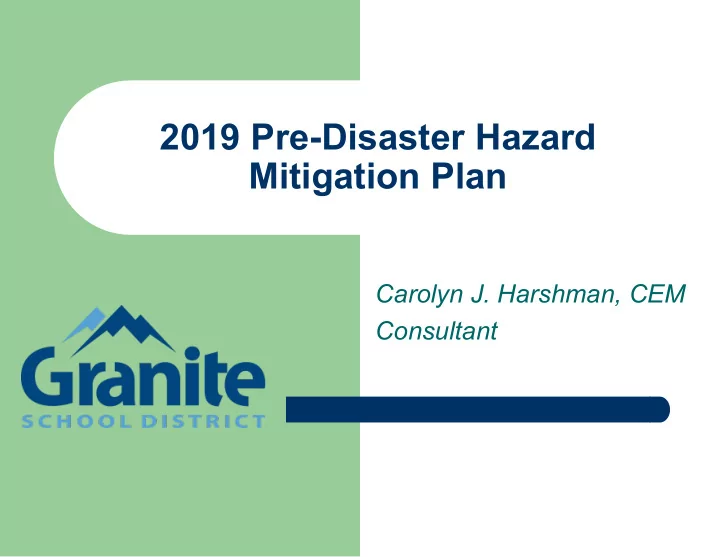

2019 Pre-Disaster Hazard Mitigation Plan Carolyn J. Harshman, CEM Consultant
What is Hazard Mitigation? Hazard Mitigation includes actions taken to eliminate or minimize threats associated with hazards. 2
Planning Team Members Support Services Police & Legal Services Prevention and Student Placement Police Risk & Property Nursing Management Information Systems Construction Services Safety & Compliance Administration School Accountability Maintenance Salt Lake County Communications Emergency Management 3
Identify Hazards • Earthquake • Wildfire • Severe Weather • Drought • Hazardous Materials • Human-Caused • Utility-Related • Landslide • Flooding • Avalanche 4 • Dam Failure
The Wasatch Fault • Utah’s longest and most active fault • 220-mile rupture • 5 segments • Shaking for close to 30 seconds in many places
Wasatch Fault SLC Segment M7.1 Granite School District 6
Wildfire 7
Severe Weather 8
Drought 9
Mitigation Actions Matrix 10
Sampling of Mitigation Action Items Multi-Hazard – Retrofit schools and facilities with secondary heat fuels. Earthquake – Protect critical facilities and infrastructure from future seismic events by installing shutoff valves and emergency connector hoses where water mains cross fault lines. 11
Sampling of Mitigation Action Items Flood – Mitigate against failure of storm drainage systems by installing, re-routing, or increasing the capacity of the system. Wildfire – Ensure use of non-combustible roof covering, fire safe construction, and defensible space practices. 12
Sampling of Mitigation Action Items Severe Weather – Strengthen roofing systems to withstand snow/ice loads. Drought – Install moisture sensors or remote irrigation controllers at all District schools and facilities. 13
Recommend
More recommend